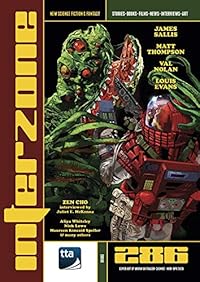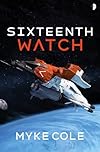Sixteenth Watch by Myke Cole
Posted in My Interzone Reviews, Reviews published in Interzone, Science Fiction at 12:00 on 8 April 2021
Angry Robot, 2020, 336 p. Published in Interzone 286, Mar-Apr 2020.

In a crowded field how do you attempt to make your military SF stand out from that crowd? Well, if you are Myke Cole you make your story about a cinderella service, the Coast Guard (which seems to be two words in the US and in whose ranks Cole has served himself.) “COASTGUARDS IN SPACE!” is a good tag-line after all, even if it might not seem to promise much in the way of battle scenes. Fans of this particular sub-genre need not worry though. There’s plenty of the usual mayhem associated with the form in these pages. Cole is careful to get some of this in early in a prologue where viewpoint character Coastguard Commander Jane Oliver is called into a confrontation between US and Chinese miners of Helium-3 on Lacus Doloris on the Moon, in which two of her crew, Kariawasm and Flecha, plus her Navy frigate commander husband Tom, are killed. This is a future where the US is (naturally) a major power on the Moon with its main rival being China. Mention is made of Russia but its presence is very much off-stage in this book, whose title derives from the days of the International Space Station and refers to the sixteen sunrises experienced there every Earth day. The sixteenth watch has come to mean any assignment in space.
As a result of the Lacus Doloris debacle Oliver was put out to grass in a training capacity back on Earth. The book proper begins when Oliver is recalled four years after Lacus Doloris to help the Coastguard in a tussle for influence over the course of events on the Moon. The navy is leaning on the (slightly flaky, insistent on quarantine against space sickness which doesn’t exist) US President to allow it free reign in policing the border between its economic zone on the Moon and that of the Chinese, using its superiority in Boarding Action, an inter-service reality TV competition broadcast once a year to large enthusiastic audiences, which the Marines have won several years running, as evidence for its suitability for the task. The Coastguard’s high command is anxious to counter this as they regard the Navy as far too gung-ho and liable to start a war. They see a possible Coastguard victory in the forthcoming Boarding Action as the perfect antidote. Oliver is given the job of training the crew along with the carrot of promotion to Admiral. Of course feathers are ruffled, her unconventional methods provoking confrontations both among the crew and with the Navy, the Marines and her own commanders. Complicating all this for Oliver is her relationships with her son Adam, off doing his own thing on Earth, and daughter Alice, now working on the moon and expecting her to retire there.
Cole is at pains to emphasise that the coastguards’ main mission is not fighting (though they will – and do – when they have to) but to save lives. Oliver is determined not to make the same mistakes as before as well as to avoid accidentally provoking a war. Even four years on the events on Lacus Doloris still hang over the thoughts of several of the characters. Pictures of the dead Kariawasm and Flecha are on the wall of the training ship and implicit comparisons are drawn about relative abilities. In a hard-boiled service this almost morbid angst is surely somewhat unlikely and probably counter-productive.
Cole does seem keen either to appear right-on or else to niggle the (presumably) main readership of military SF. The Navy’s 11th fleet flagship is named the USS Obama, the Marines’ toughest operative is a niqab and hijab wearing hulk of a woman, characters, Oliver especially (despite her military sang froid and competence,) display emotion and sentimentality with surprising alacrity. Yet the book is still crammed with military jargon and acronyms – so much so that Cole has felt the need to include a Glossary.
The above would-be humanising touches and reflections on the ethics, responsibilities and effective strategies for leadership aside, in the end we have innumerable puffs of mist as spacesuits are punctured by weaponry and – surely precious – atmosphere is (deliberately or otherwise) vented to vacuum from ships, the same old high body count, the same old recounting of deaths of combatants – and non-combatants. Military SF, doing what it says on the tin.
The following did not appear in the published review.
Pedant’s corner:- In the Author’s Note; “at the end of the this book” (either ‘the’ or ‘this’, not both.) Otherwise: Aries’ (Aries’s, several instances) “folded over their back” (their backs,) autocannons (the plural of cannon is cannon, therefore ‘autocannon’,) “a single antennae” (one of them is an antenna,) a missing comma before a piece of direct speech (x 6,) cox’sun (cox’n, innumerable instances.) “The only thing that came close were their two children” (the only thing was, or, the only things were,) “off the roof one of the government habs” (off the roof of one of the government habs.) “She turned back the class” (back to the class,) Elias’ (Elias’s,) kindergartners (kindergarteners,) a missing opening quote mark at a chapter heading, “the bottom the of the screen” (the bottom of the screen,) “in and endless loop” (in an endless loop,) “someone of the other end of the line” (on the other end,) “as the silenced stretched” (silence,) “dancing down bow” (only sensible if ‘down bow’ is a naval term,) O-TRACEN (elsewhere always OTRACEN,) a question ended with a full stop instead of a ‘?’,) “on the whole installation” (in the whole installation,) “Ho folder his arms” (folded,) Kariwasm (x 2, elsewhere [-1] always Kariawasm,) “enormity of the task” (it wasn’t a dreadful or despicable task, just a daunting one, so enormity is not warranted as a description,) “between themselves at the enemy” (and the enemy,) “let alone being able” (the rest of the sentence was in past tense, so, ‘been able’.) “Oliver would see” (could see,) “lay of the land” (lie,) Okonwo (elsewhere [-1] always Okonkwo,) conturbernium (elsewhere always contubernium.) “‘There’s a only one surefire way’” (no ‘a’ needed,) imposter (impostor, please,) “onto the top the of his head” (no, ‘the’ needed,) “comfortable in dear to her” (and dear makes more sense,) a missing comma at the end of a piece of direct speech, Pervez’ (Pervez’s,) “‘to let you do your way’” (to let you do it your way’,) “a work bench someone had clearly been checking autocannon loads” (a work bench where someone had clearly been checking autocannon loads.) “This is was right call” (This was the right call,) “in in” (only one ‘in’ needed,) “when the clocking was ticking away” (when the clock was,) “the crowd … were” (was,) “to make the squint even against the glass’ glare dampeners” (to make them squint even against the glass’s glare dampeners.) “‘We’re are learning’” (We are learning,) Kariaswasm (Kariawasm,) “to wonder if maybe wasn’t going to speak” (if he maybe.) “Earth was a glowing green-blue wedge …shining nearly as bright as a star” (from Moon orbit? Much, much brighter than a star, surely?) Santos’ (Santos’s.) “I takes Oliver a full thirty seconds” (rest of passage is in past tense, so, ‘It took Oliver thirty seconds’,) Baskins’ (Baskins’s, x 2,) “as the gained on the runner so rapidly, it looked as if” (as they gained so rapidly it looked as if,) “when the immediate dangers was past”(either ‘danger’ or ‘were’.) “Protocol forbid her” (forbade.) “‘I could give a fuck about’” (context demands, ‘couldn’t give a fuck about’ rather than ‘could’. Do USians really use the inverse?) “‘Welp’” (context implies ‘Well’, x 2.) Oknonkwo (Okonkwo,) “‘I need you work with the team’” (I need you to work with the team,) “‘I tell you too’” (to,) “the impact of the team’s effectiveness” (on the team’s effectiveness.) “‘Doesn’t hurt when I breath’” (breathe,) “she could she the” (she could see the, x 2,) “two hospital corpsman” (corpsmen,) “and turns back to him” (turned,) pollenating (pollinating,) “looked at Each of the crew’s faces” (each,) “as the she fired the bow thrusters” (no first ‘the’ needed,) “‘Turret’s clear!’ He radioed a moment later’” (‘Turret’s clear!’ he radioed a moment later,) “in a pinch” (at a pinch,) “court marital” (martial,) “had originally been surrounded what must have been” (had originally been surrounded by what must have been,) “her antennae was intact” (antenna,) a missing end quotation mark. “‘Ma,am,’” (Ma’am,) “where a broad bandage swatched his abdomen” (swathed,) the Obama (elsewhere Obama, CO2 (CO2,) “where’d she’d been” (where she’d been.) In the Glossary; “on the moons’ surface” (Moon’s.) “Artificial generated by” (Artificial gravity generated by.)




